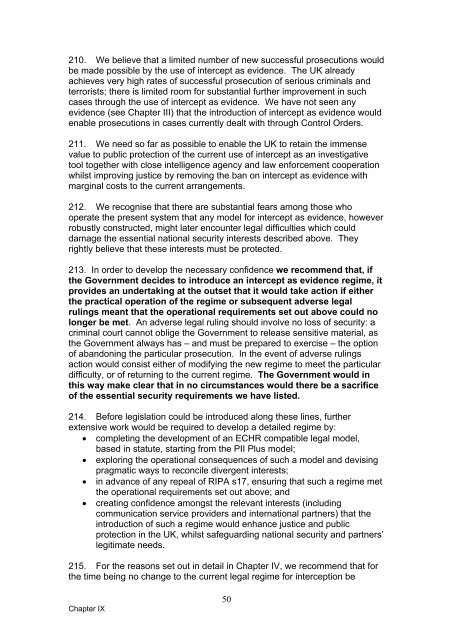Privy Council Review of intercept as evidence: report - Official ...
Privy Council Review of intercept as evidence: report - Official ...
Privy Council Review of intercept as evidence: report - Official ...
Create successful ePaper yourself
Turn your PDF publications into a flip-book with our unique Google optimized e-Paper software.
210. We believe that a limited number <strong>of</strong> new successful prosecutions would<br />
be made possible by the use <strong>of</strong> <strong>intercept</strong> <strong>as</strong> <strong>evidence</strong>. The UK already<br />
achieves very high rates <strong>of</strong> successful prosecution <strong>of</strong> serious criminals and<br />
terrorists; there is limited room for substantial further improvement in such<br />
c<strong>as</strong>es through the use <strong>of</strong> <strong>intercept</strong> <strong>as</strong> <strong>evidence</strong>. We have not seen any<br />
<strong>evidence</strong> (see Chapter III) that the introduction <strong>of</strong> <strong>intercept</strong> <strong>as</strong> <strong>evidence</strong> would<br />
enable prosecutions in c<strong>as</strong>es currently dealt with through Control Orders.<br />
211. We need so far <strong>as</strong> possible to enable the UK to retain the immense<br />
value to public protection <strong>of</strong> the current use <strong>of</strong> <strong>intercept</strong> <strong>as</strong> an investigative<br />
tool together with close intelligence agency and law enforcement cooperation<br />
whilst improving justice by removing the ban on <strong>intercept</strong> <strong>as</strong> <strong>evidence</strong> with<br />
marginal costs to the current arrangements.<br />
212. We recognise that there are substantial fears among those who<br />
operate the present system that any model for <strong>intercept</strong> <strong>as</strong> <strong>evidence</strong>, however<br />
robustly constructed, might later encounter legal difficulties which could<br />
damage the essential national security interests described above. They<br />
rightly believe that these interests must be protected.<br />
213. In order to develop the necessary confidence we recommend that, if<br />
the Government decides to introduce an <strong>intercept</strong> <strong>as</strong> <strong>evidence</strong> regime, it<br />
provides an undertaking at the outset that it would take action if either<br />
the practical operation <strong>of</strong> the regime or subsequent adverse legal<br />
rulings meant that the operational requirements set out above could no<br />
longer be met. An adverse legal ruling should involve no loss <strong>of</strong> security: a<br />
criminal court cannot oblige the Government to rele<strong>as</strong>e sensitive material, <strong>as</strong><br />
the Government always h<strong>as</strong> – and must be prepared to exercise – the option<br />
<strong>of</strong> abandoning the particular prosecution. In the event <strong>of</strong> adverse rulings<br />
action would consist either <strong>of</strong> modifying the new regime to meet the particular<br />
difficulty, or <strong>of</strong> returning to the current regime. The Government would in<br />
this way make clear that in no circumstances would there be a sacrifice<br />
<strong>of</strong> the essential security requirements we have listed.<br />
214. Before legislation could be introduced along these lines, further<br />
extensive work would be required to develop a detailed regime by:<br />
completing the development <strong>of</strong> an ECHR compatible legal model,<br />
b<strong>as</strong>ed in statute, starting from the PII Plus model;<br />
exploring the operational consequences <strong>of</strong> such a model and devising<br />
pragmatic ways to reconcile divergent interests;<br />
in advance <strong>of</strong> any repeal <strong>of</strong> RIPA s17, ensuring that such a regime met<br />
the operational requirements set out above; and<br />
creating confidence amongst the relevant interests (including<br />
communication service providers and international partners) that the<br />
introduction <strong>of</strong> such a regime would enhance justice and public<br />
protection in the UK, whilst safeguarding national security and partners’<br />
legitimate needs.<br />
215. For the re<strong>as</strong>ons set out in detail in Chapter IV, we recommend that for<br />
the time being no change to the current legal regime for <strong>intercept</strong>ion be<br />
Chapter IX<br />
50
















